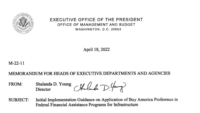The White House has issued final guidance that aims to help federal agencies carry out the Infrastructure Investment and Jobs Act-mandated Buy America program, which seeks to expand the use of domestic preferences in federally funded infrastructure projects.
Construction and transportation industry officials say that implementing the new guidance will pose challenges, for example, in getting materials certified as adhering to the Buy America requirements.
The guidance document, which the White House’s Office of Management and Budget released on Aug. 14, deals with the Build America, Buy America Act (BABA), which became law in November 2021 as part of the IIJA.
View a White House/OMB summary of new guidance here.
Although the White House labels the guidance "final," it may well not be the last administrative word on Buy America. The OMB document states that it "is not intended as comprehensive guidance on all topics related to the implementation of BABA."
The new guidance also says that OMB may issue additional guidance in the future as it gets further feedback from federal agencies, recipients of federal funds, contractors, manufacturers and other stakeholders.
Jimmy Christianson, Associated General Contractors of America vice president, government relations, said in an interview that the latest guidance is an improvement over earlier versions. But Christianson added that contractors "will still be confused" by the requirements under the new guidance.
Federal domestic-preference requirements have existed for decades. Preferences for iron, steel and some types of manufactured products have been in place since before the IIJA was signed into law and are included in the latest guidance.
The IIJA/BABA provision added construction materials as a category of products to be covered by Buy America.
Manufactured products are defined as those having 55% domestic content, as the IIJA states.
BABA also expands the Buy America program’s reach beyond IIJA-funded projects, to include projects that receive funds from other federal spending measures, such as regular appropriations.
That wider scope is continued under the latest guidance, which takes effect 60 days after it is published in the Federal Register,
Livia Shmavonian, director of the White House Made in America program, said in a statement that the guidance will “boost the use of American-made goods in infrastructure projects—which will bolster American businesses, workers and economic growth.”
Under the new guidance, the types of construction materials subject to Buy America are: nonferrous metals, plastic and polymer-based products; glass; fiber optic cable; optical fiber; lumber; engineered wood; and drywall.
Most of those products were carry-overs from those mentioned in the IIJA and in an April 2022 interim OMB memo on Buy America.
The new guidance does add engineered wood to the list.
It also says that Buy America does not apply to "tools, equipment and supplies, such as temporary scaffolding, brought to the construction site and removed at or before the completion of the infrastructure project."
Paving-Related Materials Excluded
The IIJA text specifically excludes from Buy America requirements several types of paving-related materials: cement and cementitious materials, aggregates such as stone, sand and gravel; and aggregate binding agents or additives.
The new guidance states that those exclusions will remain in place. That is good news for organizations such as the National, Stone Sand & Gravel Association, which lobbied to get the exclusions into the IIJA.
But an American Road & Transportation Builders Association analysis of the new guidance notes that the paving-related materials will not be exempted from Buy America coverage "if they are part of a manufactured product brought to the job site, such as precast concrete."
The ARTBA analysis adds, "Wet concrete and hot-mix asphalt will remain exempt."
In the February proposed version of the guidance, OMB also considered adding paint, stains and other coatings and brick products to the construction materials to be covered by Buy America requirements. But the agency did not include those materials in the latest document.
For construction materials, “all manufacturing processes” must take place in the U.S.
AGC: Project Certification a Major Issue
Christianson says, "The number-one issue contractors will run into is being able to find manufacturers that will certify to them that their product or their material meet the requirements."
He adds that contractors will be the ones that will have to state to a project owner that the materials used on the project meet the Buy America requirements. Christianson says that if a product does not comply with the requirements, a contractor would be liable for False Claims Act violation and triple damages.
Jim McDonnell, American Association of State Highway and Transportation Officials director of engineering, said in emailed responses to questions from ENR that AASHTO does not anticipate "significant immediate impacts" on state departments of transportation from the new Buy America guidance.
McDonnell cites language in the guidance document stating that it "is intended to be high-level coordinating guidance for federal agencies to use in their own direct implementation" of the Buy America requirements.
McDonnell says that the final version also increases the April 2022 interim guidance's preliminary requirement for the number of manufacturing processes that must take place in the U.S. in order for a material to comply with the Buy America requirements. It now will include all processes. The 2022 interim version required that only the final two manufacturing processes happen in the U.S.
McDonnell adds that if the Federal Highway Administration decides to adopt the final guidance, including its expanded requirements, "states and manufacturers will likely have difficult expanding their tracking processes and finding new suppliers to meet these expanded requirements in such a short time frame."
He says a bigger concern is that the new guidance may indicate what the U.S. Dept. of Transportation and FHWA may say in a separate pending Buy America regulatory matter. It concerns a long-standing general Buy America waiver for manufactured products used on federal-aid highway projects.
FHWA issued the "public interest" waiver in 1983 and it remains in effect.





